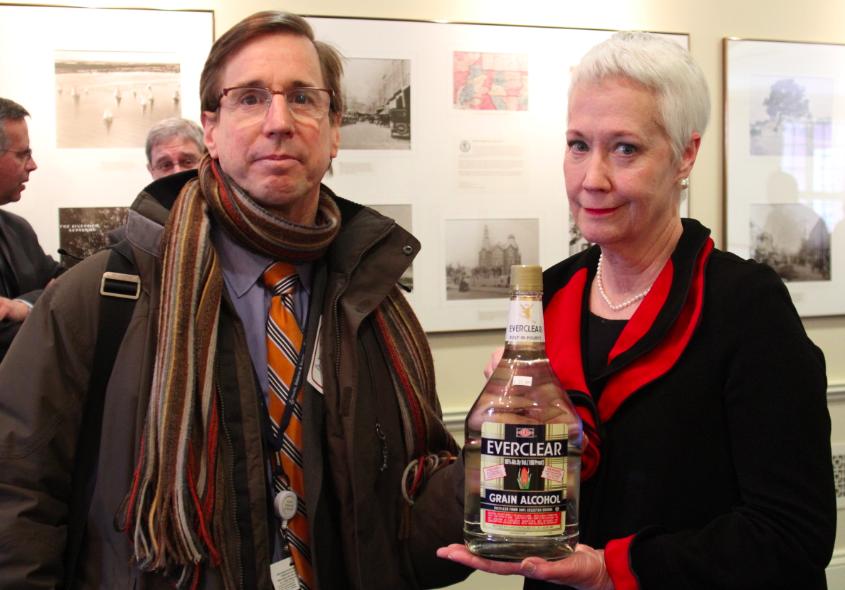Updated, Feb. 18, 10:52 p.m. — University officials lobbied in Annapolis on Monday to support a proposed ban on the sale of 190-proof grain alcohol and other extreme-strength liquors in Maryland.
The officials told the Economic Matters Committee that these odorless, colorless and tasteless products contribute to 1,825 deaths and 97,000 sexual assaults on college campuses in the US annually. A committee vote is likely next week.
The bill is aimed at products like Gem Clear and Everclear, which contain 95 percent alcohol by volume and are easily masked with fruit juices and soda at just 38 cents a shot.

Professor David Jernigan, Ph.D., Johns Hopkins Bloomberg School of Public Health and Towson University President Maravene Loeschke appear in Annapolis in support of extreme-strength alcohol ban, Feb. 17, 2014 Photo by Daniel Menefee
A concoction known as “Jungle Juice” has become a favorite on college campuses as a quick and cheap way to get high, said Dr. David Jernigan, a professor with the Johns Hopkins Bloomberg School of Public Health.
“Students have told me that this is the quickest and cheapest way to get really drunk,” Jernigan said in a brief interview with the Spy. “They fill a garbage can with a whole bunch of different flavored liquids and grain alcohol. Many times they end up sleeping with someone they didn’t plan to [or] they need a hospital transport for acute alcohol poisoning. In the acute phase the brain basically shuts down.”
He said that many students know the “Jungle Juice” is spiked but they don’t realize the strength of 190-proof alcohols until it’s too late. He said 190-proof alcohol is more than twice as potent as straight vodka.
Towson University President Maravene Loeschke said that it’s a real problem for students who try to drink responsibly at parties because not everyone knows the punch is spiked.
“They may unknowingly drink what looks like a non-alcoholic punch and that leads to very serious problems with sexual assault and date rape,” Loeschke said. “It’s troublesome because it takes away the option for those people who don’t want to get caught in that situation.”
An identical bill easily sailed through the Senate on Feb. 5 by a vote of 37-10. Bills in 2009 and 2010 also made it through the Senate but failed to pass the House. Legislators privately blame the powerful alcohol lobby.
But House Majority Whip Talmadge Branch said he would “do everything possible to get it passed” if it gets to the floor of the House.
The Maryland Collaborative to Reduce College Drinking and Related Problems, a group of 10 Maryland colleges and universities formed last fall, is lobbying hard for passage — citing statistics from National Institute on Alcohol Abuse and Alcoholism:
1,825 deaths
599,000 unintentional injuries
696,000 physical assaults
97,000 sexual assaults
150,000 alcohol-related health problems
400,000 incidents of unprotected sex
3,360,000 incidents of driving while drunk
The ban would carry penalties of up to $1,000 for anyone selling 190-proof alcohol — but it would not ban anyone of legal age from possessing the products.
Sen. Stephen Hershey, R- Queen Anne’s, was one of the 10 Republicans to oppose the Senate bill. He said legislation would do little to address alcohol abuse on college campuses.
“We are continuing to see over reactive legislation in Annapolis aimed at changing behavior, either by restrictions or by increasing or initiating new fees and penalties,” Hershey told the Spy. “Banning products that are 190 proof today leads to banning products that are 151 proof tomorrow. An outright prohibition of a specific product is not the answer.”
“We legislate safety all the time,” Jernigan said. “We have traffic lights and seat belts. This is an area where we could do something relatively small that would keep our young people safer and reduce a whole range of harmful consequences.”
“But we’re not saying this is the only thing that should be done,” Jernigan said. “The colleges involved in the collaborative are pursuing a whole range of strategies, both individually, and in the communities around the campuses.”
“We’re never going to stop young people from drinking, that’s beyond our abilities,” Loeschke said. “But to be able to walk two blocks to a liquor store and pick up something like this is working against everything we’re trying to do with our education programs.”
Del. Jay Jacobs, R-Kent, has departed from many of his Republican colleagues by supporting the ban.
“I don’t care if I’m the only Republican in Annapolis to support the ban,” Jacobs said. “There’s only one reason this kind of alcohol exists and that is to get really drunk. It has no other purpose.” He said even the most experienced drinkers can get fooled by the potency of extreme-strength alcohols.
Jacobs said that the neighbor states of Pennsylvania, Virginia, and West Virginia have banned or restricted the sale of grain alcohol and other 190-proof spirits and that Maryland needs to follow suit.
“Maryland should step up and take a good hard look at it with the amount of colleges and institutions we have in this state.”



Write a Letter to the Editor on this Article
We encourage readers to offer their point of view on this article by submitting the following form. Editing is sometimes necessary and is done at the discretion of the editorial staff.